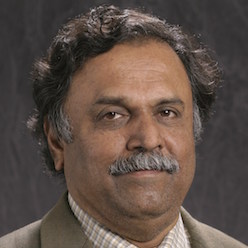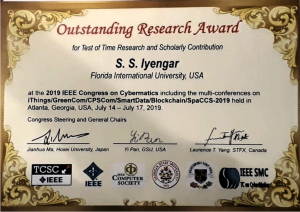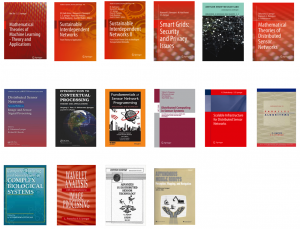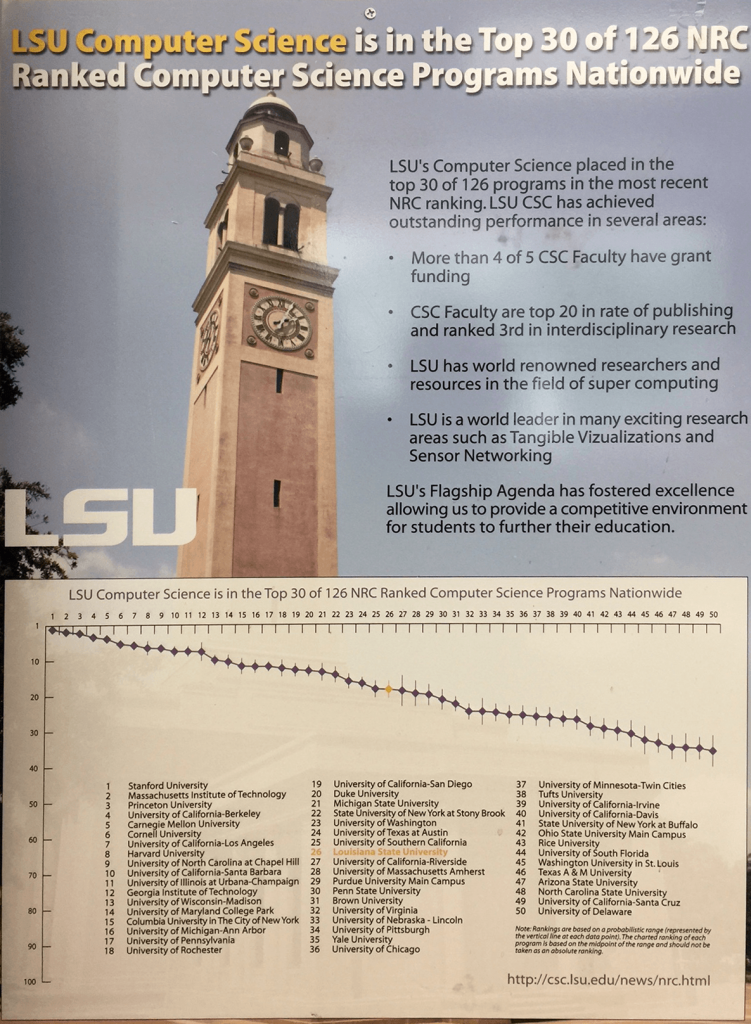
Dr. S.S. Iyengar is currently the Distinguished University Professor, Founding Director of the Discovery Lab and Director of the US Army-funded Center of Excellence in Digital Forensics at Florida International University, Miami. He is also the Distinguished Chaired Professor at National Forensics Sciences University, Gandhinagar, India. He was awarded the 2023 Karnataka Rajyotava Award (Karnataka State’s 2nd Highest Civilian Award) on November 1st, 2023. He has been involved with research and education in high-performance intelligent systems, Data Science and Machine Learning Algorithms, Sensor Fusion, Data Mining, and Intelligent Systems. Since receiving his Ph.D. degree in 1974 from Missi. State Univ., USA, he has directed over 65 Ph.D. students, many number of postdocs, and many research undergraduate students who are now faculty at Major Universities worldwide or Scientists or Engineers at National Labs/Industries around the world. He has published more than 600 research papers, has authored/co-authored and edited 32 books and hold various patents. Over the lifetime, his work, Brooks-Iyengar Algorithm has over 5223 publication(s) within this topic and has received 138,976 citation(s). The topic is also known as: Brooks–Iyengar hybrid algorithm. His h-index is 67 and is identified among the top 2% cited scholars and world scientists (from Stanford University and EBMs of JSAN journal. The book titled “Fundamentals of Brooks-Iyengar Distributed Sensing Algorithm” authored by Prof. Pawel (Poland) and others and published by Springer in 2020 celebrates S.S. Iyengar’s accomplishments that led to his 2019 Institute of Electrical and Electronics Engineers’ (IEEE) Cybermatics Congress “Test of Time Award” for his work on creating Brooks-Iyengar Algorithm and its impact in advancing modern computing. His work has been featured on the cover of many scientific journals like IEEE transactions and the National Science Foundation’s breakthrough technologies report to the US Congress by his research group in both 2014 and again in 2016.
He has served on many scientific committees and panels worldwide and has served as the editor/guest editor of various IEEE and ACM journals. His books are published by MIT Press, John Wiley and Sons, CRC Press, Prentice Hall, Springer Verlag, IEEE Computer Society Press, etc. One of his books titled “Introduction to Parallel Algorithms” has been translated into Chinese. During the last thirty years Dr. Iyengar has brought in over 65 million dollars for research and education. More recently in Spring 2021, Dr. Iyengar in collaboration with HBCUs were awarded a $2.25 M funding for setting up a Digital Forensics Center of Excellence over a period of 5 years (2021-2026). He received an honorary Doctor of Science for 4 times and recently from Poznan University of Technology in Poland in May 2023. He has been awarded the Lifetime Achievement Award 3 times (INTERPOL, BHU, IEEE) and recently for his contribution to the for his contribution to the field of Digital Forensics on November 8, 2022, during the 7th INTERPOL DIGITAL FORENSICS EXPERT GROUP (DFEG) MEETING at National Forensics Sciences University, Gandhinagar, Gujarat, India. He has provided the students and faculty with a vision for active learning and collaboration at Jackson State University, Louisiana State University, Florida International University, and across the world.
Dr. Iyengar is a Member of the European Academy of Sciences, Member of the European Academy of Arts and Sciences, a Life Fellow of the Institute of Electrical and Electronics Engineers (IEEE), a Fellow of the Association of Computing Machinery (ACM), a Fellow of the American Association for the Advancement of Science (AAAS), a Fellow of the Society for Design and Process Science (SDPS), a Fellow of the National Academy of Inventors (NAI), and a Fellow of the American Institute for Medical and Biological Engineering (AIMBE). He has received various national and international awards including the crowning Test of Time Research (for his seminal work which has impacted billions of computer and internet users worldwide) and Scholarly Contribution Award from 2019 IEEE Congress on Cybermatics, the distinguished Fulbright Scientist, the Times Network NRI (Non-Resident Indian) of the Year Award for 2017, IEEE Meritorious Service award, most distinguished CVR Award at the Society for Design and Process Science (SDPS 2017), Innovation-2-Industry Award, Distinguished Rain Makers for Leadership and Research Award, World’s Best Technology Showcase award, Technology Innovation Award Louisiana Tech University Research Foundation Inventor Award, Distinguished Research Master Award, IBM Distinguished Faculty Award, and the NRI Mahatma Gandhi Pradvasi Medal at the House of Lords in London in 2013 among others. He was awarded Satish Dhawan Chaired Professorship at IISc, then Roy Paul Daniel Professorship at LSU. He has received the Distinguished Alumnus Award of the Indian Institute of Science. In 1998, he was awarded the IEEE Computer Society’s McCluskey Technical Achievement Award and is an IEEE Golden Core Member. Professor Iyengar is an IEEE Distinguished Visitor, SIAM Distinguished Lecturer, and ACM National Lecturer. In 2006, his paper entitled, A Fast-Parallel Thinning Algorithm for the Binary Image Skeletonization, was the most frequently read article in the month of January in the International Journal of High-Performance Computing Applications. His innovative work called the Brooks-Iyengar algorithm along with Professor Richard Brooks from Clemson University is applied in industries to solve real-world applications. Dr. Iyengar’s work had a big impact; in 1988, when he and his colleagues discovered “NC algorithms for Recognizing Chordal Graphs and K-trees” [IEEE Trans. on Computers 1988]. This breakthrough result led to the extension of designing fast parallel algorithms by researchers like J. Naor (Stanford), M. Naor (Berkeley), and A. A. Schaffer (AT&T Bell Labs).
His research has been funded by National Science Foundation (NSF), Defense Advanced Research Projects Agency (DARPA), Multi-University Research Initiative (MURI Program), Office of Naval Research (ONR), Department of Energy / Oak Ridge National Laboratory (DOE/ORNL), Naval Research Laboratory (NRL), National Aeronautics and Space Administration (NASA), US Army Research Office (URO), and various state agencies and companies. He has served on US National Science Foundation and National Institute of Health Panels to review proposals in various aspects of Computational Science and has been involved as an external evaluator (ABET-accreditation) for several Computer Science and Engineering Departments across the country and the world. Dr. Iyengar has also served as a research proposal evaluator for the National Academy. Dr. Iyengar has been a Visiting Professor or Scientist at Oak Ridge National Laboratory, Jet Propulsion Laboratory, Naval Research Laboratory, and has been awarded the Satish Dhawan Visiting Chaired Professorship at the Indian Institute of Science, the Homi Bhaba Visiting Chaired Professor (IGCAR), and a professorship at the University of Paris-Sorbonne.
He served as the Director and was a Distinguished Ryder Professor of Computer Science at the Knight Foundation School of Computing and Information Sciences at Florida International University (FIU), Miami between 2011 and 2020. Prior to joining FIU, Dr. Iyengar was the Roy Paul Daniel’s Distinguished Professor and Chairman of the Computer Science department for over 20 years at Louisiana State University.
Dr. S.S. Iyengar is a computer scientist of international repute who has been a pioneer in multiple fields. Marked by his incredible record of success in the areas of world-class research, superb teaching, and excellence in community service, he has also significantly impacted industry, through his many discoveries and patents. His distinguished international and national research work have consistently been recognized by US government agencies, industry pioneers, and his research colleagues. His work has been featured on the cover of the National Science Foundation’s breakthrough technologies in both 2014 and again in 2016.
Dr. Iyengar has garnered multiple awards for his work and made fundamental contributions in a variety of areas that impact our lives today. His seminal contributions continue to be seen in places like Raytheon, Telcordia, Motorola the United States Navy, DARPA and other universities and research laboratories around the world.

A detailed account of the impact that this algorithm and the various applications of this work is highlighted in the book titled “Fundamentals of Brooks-Iyengar Distributed Sensing Algorithm” published in 2020 by Springer.

Dr. Iyengar received the Lifetime Achievement Award Conferred by ISAM(International Society of Agile Manufacturing ) IIT-Banaras Hindu University for his lifelong contribution to the fields of Engineering and Computer Science, December 17, 2012. [Picture 1, Picture 2] .He also received the 2019 IEEE Intelligence and Security Informatics (ISI) Research Leadership Award for his contribution in the area of distributed sensor systems, 2019. [link] and the Lifetime Achievement Award for his contribution in Research and Education in the area of Distributed Sensor System at 25th IEEE International Conference on High-Performance Computing, Data and Analytics, December 2018. [link]
Dr. Iyengar has been involved with research and education in high-performance intelligent systems, Data Science and Machine Learning Algorithms, Sensor Fusion, Data Mining, and Intelligent Systems, and other inter-disciplinary areas. Since receiving his Ph.D. degree in 1974 from MSU, USA, he has directed over 60 Ph.D. students, 100 Master’s students, and many undergraduate students who are now faculty at Major Universities worldwide or Scientists or Engineers at National Labs/Industries around the world. He has published more than 600 research papers, has authored/co-authored and edited 26 books. His h-index is 63 with over 19000 citations. His books are published by MIT Press, John Wiley and Sons, CRC Press, Prentice Hall, Springer Verlag, IEEE Computer Society Press, etc.

One of his books titled “Introduction to Parallel Algorithms” has been translated into Chinese. During the last thirty years Dr. Iyengar has brought in over 65 million dollars for research and education. He has providing the students and faculty with a vision for active learning and collaboration at Jackson State University, Louisiana State University, Florida International University, and across the world. Dr. Iyengar’s career is a distinguished one, marked by his incredible record of success in groundbreaking research, inspirational teaching and excellence in community service. It is his consistent drive to fight for and promote the minority and underrepresented groups which is his passion.
He has also worked as a visiting scientist at Oak Ridge National Lab, Jet Propulsion Lab, Satish Dhawan Professor at IISc and Homi Bhabha Professor at IGCAR, Kalpakkam and University of Paris and visited Tsinghua University, Korea Advanced Institute of Science and Technology (KAIST) etc. His research interests include High-Performance Algorithms, Biomedical Computing, Sensor Fusion, and Intelligent Systems for the last four decades. His research has been funded by the National Science Foundation (NSF), Defense Advanced Research Projects Agency (DARPA), Multi-University Research Initiative (MURI Program), Office of Naval Research (ONR), Department of Energy / Oak Ridge National Laboratory (DOE/ORNL), Naval Research Laboratory (NRL), National Aeronautics and Space Administration (NASA), US Army Research Office (URO), and various state agencies and companies. He has served on the US National Science Foundation and National Institute of Health Panels to review proposals in various aspects of Computational Science and has been involved as an external evaluator

(ABET-accreditation) for several Computer Science and Engineering Departments across the country and the world. Dr. Iyengar has also served as a research proposal evaluator for the National Academy of Engineering. Dr. Iyengar is developing computational measures for predicting DNA mutations during cancer evolution, using wavelet analysis in cancer genome research, and designing smart biomarkers for bioremediation. His inventions have significantly impacted biomedical engineering and medicine. He recently patented a simple, low-cost device for early intervention in glaucoma, and was involved in early detection of lung cancer by developing a 4D motion model jointly with Southwestern Medical School. He is also the founding editor of the International Journal of Distributed Sensor Networks, and he has been on the Editorial Board of many IEEE Journals/Guest Editor including Transaction on Computers, Transactions, and Data Knowledge Engineering, IEEE Signal Processing, IEEE Software Engineering, IEEE Computers, ACM Digital Threats Research and Practice, ACM Computing Surveys, Journal of Computers and Electrical Engineering etc. Dr. Iyengar continues to be very active in multiple professional conferences and workshops in the areas of his research interest. In 1988, when he and his colleagues discovered “NC algorithms for Recognizing Chordal Graphs and K-trees” [IEEE Trans. on Computers 1988]. This breakthrough result led to the extension of designing fast parallel algorithms by researchers like J. Naor (Stanford), M. Naor (Berkeley), and A. A. Schaffer (AT&T Bell Labs).
Dr. Iyengar is a computer scientist of international repute, and a pioneer in the field and has made fundamental contributions in the areas of information processing for sensor fusion networks, robotics and high-performance algorithms, all relevant to critical event detection systems as seen in following:
- Co-inventor of the Brooks–Iyengar algorithm for noise tolerant distributed control which bridges the gap between sensor fusion and Byzantine fault tolerance, providing an optimal solution to the fault-event disambiguation problem in sensor-networks (1996)
- Co-inventor of a novel, paradigm shifting method for grid coverage of surveillance and target location in distributed sensor networks (2002)
- Provided seminal work for automated analyses and interpretation of satellite imagery of the ocean and other unknown terrain (1994)
- Co-invented the Cognitive Information Processing Shell, a complex event processing architecture and engine which recognizes and responds to complex patterns in mission critical, real-time applications (2010)
- Solved an open problem in graph recognition, laying foundation for fast parallel computing for large scale data sets (1988)
- As a Founding Director of Discovery Lab (in Miami), his innovative work led to creation of the Telebot—a telepresence robot for assisting injured law enforcement officers – ranked second in Mashable’s listing of “14 innovations that improved the world in 2014“, which garnered over 400 world-wide media articles and interviews for radio, television and print, and led to US Patent 2018/ US9934613B2 issued in March 2018, for Systems and Methods for Augmented Reality Interaction.
- Florida Hall of Inventors nomination for the year 2021
- Dr. Iyengar and Nulogix received Florida Innovation Award, 2012
Dr. Iyengar and Nulogix were awarded the third prize in the 2012 Innovation 2 Industry (i2i) Florida competition. The innovative and patented technology invented by the team enables a person to see changes in intraocular pressure by observing their eye using a small handheld device. [“Funding the Dream”, Harbor Style Magazine – June]
He has been a driving force and a major contributor in FIU, LSU and other universities he has been associated with to reach global recognition and excellence. During his tenure as Director at LSU, the

Computer Science Department raised to achieve the top 30 in the NRC Ranking and similar is the case with his tenure at FIU.
Dr. S S Iyengar is also a proud co-founder of the company “Flexible IR” that works on designing, creating and deploying tools for Incident Response that are flexible and robust. He provides technical guidance with $1 remuneration. The company’s motive is based on the assumption that A FAST RESPONSE during an incident is highly required. The company partners with its clients to quickly contain an ATTACK OR BREACH happening in the company. They also provide a guided methodology using flexible runbooks to speed up the incident response process. With their IN-PREMISE setups, they make sure that the client data never leaves their system or organization. The company enables careful collaboration and virtual teams during breaches.
The products and services offered include:
- Flexible Runbooks – Understandable and easy baseline run books to handle incidents. The runbooks can be customized to the client’s specific environment and security analyst. Expert audit of runbooks is also provided as a service.
- Real life drills – The real-life drills provided ensure that the client’s teams are always in a fighting mode thus assisting the security team to be better prepared and respond better in case of incidents and breaches.
- Analytics – Insights on how each incident has been handled are provided. Categorization and similarity analysis of Incidents and Prometheus reports as required for IR compliance are also provided by the company.
The company has also proposed a New Kanban based Incident Response product that has been welcomed by Honeywell and is to be presented in the reputed “2018 PSIRT Technical Colloquium” in Atlanta, USA on February 27-28, 2018.
More details about the company and the products can be found on their website http://flexibleir.com/
He has also initiated a Gifted and Talented Program with the National Institute of Advanced Sciences (NIAS) with FIU faculty. For details, visit identifyingtalents.org
